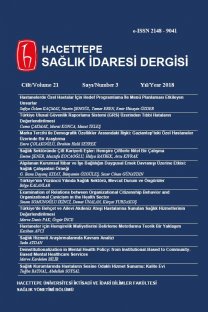ECZANE ÇALIŞANLARININ SALGIN SÜRECİ VE SOSYAL DAMGALANMA ALGISI
THE EPIDEMIC PROCESS OF THE PHARMACY EMPLOYEES AND PERCEPTION OF SOCIAL STIGMA
___
- 22 Mayıs 2014 Tarihli ve 29007 Sayılı Resmî Gazete.
- Aksoy, Ş., & Mamatoğlu, N. (2020). COVID-19 Salgını döneminde örgütlerde güvenlik ikliminin iş güvenliği uzmanları perspektifinden değerlendirilmesi. Avrasya Sosyal ve Ekonomi Araştırmaları Dergisi, 7(5), 26-37.
- Arslan, R. & Filiz, M. (2020). Sağlık eğitimi alan öğrencilerin COVID-19 salgınına yönelik algılarının değerlendirilmesi. Cumhuriyet Üniversitesi İktisadi ve İdari Bilimler Dergisi , 21 (2) , 1-18.
- Baysal, G. Ö. D. (2013). Damgalanma ve ruh sağlığı. Arşiv Kaynak Tarama Dergisi, 22(2), 239-251.
- Brooks, S. K., Webster, R. K., Smith, L. E., Woodland, L., Wessely, S., Greenberg, N., & Rubin, G. J. (2020). The psychological impact of quarantine and how to reduce it: rapid review of the evidence. The Lancet.
- Çalıkuşu, M. , Güneş, G. & Özçelikay, G. (2021). COVIID-19 pandemı̇sı̇nı̇n toplum eczacğı hı̇zmetlerı̇ne etkı̇lerı̇. Journal of Faculty of Pharmacy of Ankara University , 45 (2) , 194-21.
- Çam, O., & Çuhadar, D. (2011). Ruhsal hastalığa sahip bireylerde damgalama süreci ve içselleştirilmiş damgalama. Psikiyatri Hemşireliği Dergisi, 2(3), 136-140. Çankaya M., COVID-19 Pandemı̇sı̇ ve sağlık çalışanlarının ı̇yı̇lı̇k halı̇ değı̇şı̇mı̇, International Congress On Social Sciences 7., 23-25 September 2020 Budapest, Hungary, Proceeding Book, 446-460.
- Çırakoğlu, O. C. (2011). Domuz gribi (H1N1) salgınıyla ilişkili algıların, kaygı ve kaçınma düzeyi değişkenleri bağlamında incelenmesi. Türk Psikoloji Dergisi, 26(67). Ekiz, T , Ilıman, E & Dönmez, E . (2020).
- Bireylerin sağlık anksiyetesi düzeyleri ile COVID-19 Salgını kontrol algısının karşılaştırılması. Uluslararası Sağlık Yönetimi ve Stratejileri Araştırma Dergisi , 6 (1) , 139-154.
- Eren-Bana, P . (2020). COVID-19 Salgını sürecinde sağlık çalışanlarının yaşadığı olumsuz durumların ve sosyal damgalanma algısının değerlendirilmesi . Research Journal of Business and Management 7 (4) , 288-298 .
- Gencer, N. (2020). Pandemi sürecinde bireylerin koronavirüs (COVID-19) korkusu: Çorum örneği . Uluslararası Sosyal Bilimler Akademi Dergisi , (4) , 1153-1173.
- Küçükalı̇, A. & Çınar, O. (2020). Akademisyenlerin Kovid-19 Algısı. Atatürk Üniversitesi Sosyal Bilimler Enstitüsü Dergisi, 24 (4), 1633-1654.
- Maunder, R., Hunter, J., Vincent, L., Bennett, J., Peladeau, N., Leszcz, M., & Mazzulli, T. (2003). The immediate psychological and occupational impact of the 2003 SARS outbreak in a teaching hospital. Cmaj, 168(10), 1245-1251.
- Ramaci, T., Barattucci, M., Ledda, C., & Rapisarda, V. (2020). Social stigma during COVID-19 and its impact on HCWs outcomes. Sustainability, 12(9), 3834. Sağlık Bakanlığı Türkiye İlaç ve Tıbbi Cihaz Kurumu, Kronik Hastalıklarda Reçetesiz İlaç Temini konulu yazısı 19.04.2020
- Salcan S. & Sarıkaya B. (2020) COVID-19 Pandemisinde eczanede çalışan personelin kaygı, uykusuzluk ve depresyon prevalansı, Turk Journal Public Health 2020;18(Special İssue):58-65.
- Samancı, S. & Tarcan, G. (2021). The use of personal protective equipment in healthcare services and difficulties experienced by pharmacy employees during the COVID-19 pandemic. Hacettepe Sağlık İdaresi Dergisi, 24 (4) , 867-884 .
- Uluslararası Eczacılık Federasyonu (FIP) COVID-19: Eczacılar ve Eczane İşgücü İçin Kılavuz. 26.Mart. 2020 (Güncelleme tarihi).
- Verma, S., Mythily, S., Chan, Y. H., Deslypere, J. P., Teo, E. K., & Chong, S. A. (2004). Post-SARS psychological morbidity and stigma among general practitioners and traditional Chinese medicine practitioners in Singapore. Ann Acad Med Singapore, 33(6), 743-8.
- Williams, J., & Gonzalez-Medina, D. (2011). Infectious diseases and social stigma. Applied Innovations and Technologies, 4(1), 58-70.
- Yayın Aralığı: Yılda 4 Sayı
- Başlangıç: 2015
- Yayıncı: Hacettepe Üniversitesi İktisadi ve İdari Bilimler Fakültesi
HEMŞİRELERDE İŞLE İLGİLİ YAŞAM KALİTESİ ÖLÇEĞİNİN TÜRKÇE VERSİYONUNUN PSİKOMETRİK ÖZELLİKLERİ
SAĞLIK ÇALIŞANLARININ COVID-19 İLE İLGİLİ ALGILARININ KAYGI DÜZEYİNE ETKİSİ
Ahmet YILDIZ, Erhan EKİNGEN, Mehmet TOP
ECZANE ÇALIŞANLARININ SALGIN SÜRECİ VE SOSYAL DAMGALANMA ALGISI
Perihan EREN BANA, Duygu GÜRCAN COŞKUNER
Eczane Çalışanlarının Salgın Süreci ve Sosyal Damgalanma Algısı
Perihan EREN BANA, Duygu GÜRCAN COŞKUNER
SAĞLIK BAKIM ALANINDA SÜREKLİ İYİLEŞTİRME MODELLERİ
Nermin UYURDAĞ, Aytolan YILDIRIM, Tuğba ULUOCAK KÖSE
ÇOCUKLUK ÇAĞI OBEZİTESİNİN SAĞLIK HARCAMALARINA ETKİLERİ: TÜRKİYE'DEN KANITLAR
Yusuf ÖCEL, Kahraman ÇATI, Songül YORGUN, M. Fatih BAYRAKTAR
GELENEKSEL VE TAMAMLAYICI TIBBA YÖNELİK GÖRÜŞLERİN DEĞERLENDİRİLMESİ: AİLE SAĞLIĞI MERKEZİ ÖRNEĞİ
